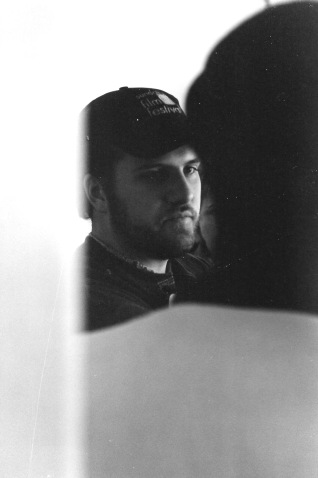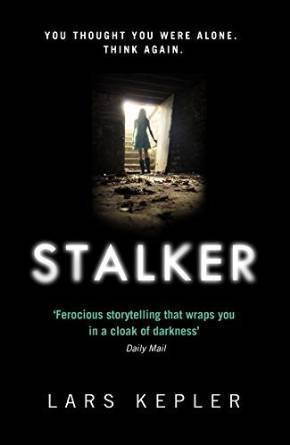It’s funny in hindsight to look back at any film production and think of how many times your train almost toppled off the edge of the 1000 foot cliff you were unknowingly navigating across through the fog of war. Day 6 – the end of the first week’s filming on a 3 week shooting schedule – was just one of those moments on “American Reel”. That was the first time during the film’s production, but it would not be the last, that David Carradine walked off the set and refused to come back until his demands were met. It was also the first time David’s fiance’, Marina Anderson, became the one to save the film from certain shut down. Her brave intervention was the only thing that kept the cameras rolling that day. Without her, the production likely would have been shut down.
Week 1 of the production of “American Reel” had been increasingly difficult as the days wore on. David was late to set every single day by at least an hour. Either he would keep his driver/assistant waiting in the hotel lobby, or he would keep hair/makeup waiting, or he would keep wardrobe waiting. Either way you sliced it, he kept all of us waiting until he was darn well good and ready. The pressures on everyone just compound when you’re constantly running late. It quickly demoralizes the crew and the rest of the cast, and the respect for the film’s leading man quickly goes out the window and turns into a running joke on and off the set. “What time’s call in the morning?” “I don’t know, why don’t you go ask Carradine?”
This Saturday morning was no exception. For some reason, David had gotten the notion in his head that we were shooting a music video for the single of “American Reel”. In the endless data digital filmmaking age we live in today, it’s doubtless difficult for many to understand the limitations one deals with when shooting actual rolls of film. Aside from the extra time it would have required to shoot enough coverage for an entire music video, we simply did not have the film stock for it. At a total cost of up to $250 per minute of exposed film, I barely had enough film stock in my budget to complete the film as it was. The last thing I needed was a side project that would burn up 20% of my entire film budget in one afternoon. Besides that, it was another episode of “David’s Plan vs. Everyone Else’s Plan”. He got it in his head that we were going to shoot a music video for him while we were here, and he was not going to participate in anything for the day until he got his way.
Add to that, we had been talking up this big concert scene to the public for weeks, hoping to get enough extras in this small auditorium to be able to make it look like a full concert hall. Once the camera and lights were set up, our efforts to bring in extras to play the part of eager concert-goers had netted us well over 500 people, who were excitedly waiting in the audience for their chance to be in a scene with a movie icon.
Before the extras had been let into the auditorium, David and I talked through the shots I was planning for the concert scene. At some point in that conversation, he walked away. When he came back, he started in on me. “What about the music video?”
 This was a new one. So far this week, I had been challenged by him at many turns and
This was a new one. So far this week, I had been challenged by him at many turns and
had to debate my way to getting the shots I wanted with him daily, but this was an entirely new tactic – adding things that didn’t even exist in the script. “We’re supposed to be shooting coverage for my music video!” David yelled, then stormed off to his dressing room.
For a moment, I thought I must have imagined this shift into the twilight zone. “What in the world was that all about?” I said to Guy Camara, my 1st A.D. Guy just smiled a little and said, “We’re shooting a music video today?” We both just shook our heads, blew it off and went about our rounds with the camera, lighting and sound departments. About 20 minutes later, Guy came back with the news. “David won’t come out of his dressing room until we agree to shoot his music video.” With the 500+ extras now streaming into the auditorium, some having driven in the night before from 3 hours away – just to be in a David Carradine movie, we now had a massive problem. This was the adult manifestation of a child’s temper tantrum, starring David Carradine.
“I don’t know who told him we were shooting a music video today, but it wasn’t me!” I’m sure the look on my face was a combination of convoluted frustration mixed with need for caffeine. Before I could even get another word out, Darrell Griffin, one of the film’s producers, came to inquire about the same thing.
“Did you tell David we were shooting a music video?” he asked me. “No!” I barely had enough film for the day to finish the concert scene as scripted. Darrell and I both looked at each other, feeling not just the week’s tension with him that had built up, but the week’s worth of malarkey he, myself and producer Jordan Rush had all been dealing with from David. Darrell just happened to be the first one to pop. I wasn’t far behind.
 Producer Darrell Griffin.
Producer Darrell Griffin.
Darrell was the most on-edge I’d seen him all week. I learned he had just emerged from talking with David, who had dug his heels in, even refusing to allow hair/makeup and wardrobe to even begin with him, putting us hours behind schedule. “Do you want to go in there and talk to him? Maybe, as the Director, he’ll listen to you.” Darrell asked. “If I have to go in there again, I’m going to fire him on the spot and shut this whole film down.” I can’t lie. The thought of seeing David Carradine get fired on the spot was, in that moment, sadistically appealing.
In what would shortly prove to be the best producing move of the entire film, Darrell had already put in a call to David’s better half, Marina, and advised her of the situation at hand. He and producer Jordan Rush had long since figured out that Marina was the only balancing force in the David Carradine equation. She had only just flown in the night before, and we were already calling on her to bring some reason to these daily negotiations with David.
I decided I would go in and try to talk to him. It went about like the conversation had that morning that had lit this fuse in the first place. Here I stood, a 24 year-old directing his first feature film, staring down David Carradine, once a Hollywood giant in my mind, but now a Goliath to be slayed. I would like to say I succeeded, but I did not. I retreated to talk again with Darrell. It was the first time I realized that the production may not survive this very morning. The film’s only hope was Marina.
She had come quickly to the set from the hotel and was talking to David in his dressing room as we spoke. Darrell, Guy and I strategized together for a few minutes. Of course, none of us wanted to shut down the film. Darrell, Jordan and myself had to answer to the financier, who had put up the money for the film based in large part on my recent track record and Darrell and Jordan’s signatures on the bank loan. Shutting down would mean ruin for the picture, and for my fledgling career in particular.
After 10 or 15 minutes, Marina emerged from David’s lockdown den. A brief conversation ensued as to how to appease the tyrant behind the locked door. We agreed to shoot one complete take of the entire song from the dolly tracking through the audience. Anything more than that he could reimburse the production for, but only after we had the coverage needed for the film itself. Darrell made it clear that this was the only concession David was going to get before the film’s attorney got involved. Marina, unwittingly caught in the middle, nodded calmly and disappeared into the dressing room.
10 minutes passed, and David emerged. Without another word, he walked to hair/makeup and sat down. And with that, “American Reel”, and my directing career, was saved by Marina Anderson. For that event alone, I owe a deep debt of gratitude to her.
I only wish that Marina had stuck around for the rest of the production. While she was there, David was still late but mostly under control. The minute she left, and we went into the last week of filming, David’s premiere temper tantrum performance would grace our set, and it would be the closest I would ever come to walking off the set and never coming back.
To Be Continued…
Read more about life with David Carradine in Marina Anderson’s book:
“David Carradine: The Eye of My Tornado”
Amazon Paperback
Kindle
Barnes & Noble Paperback
Nook
Share this:





